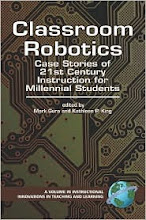Good article from gettingsmart.com...
"How Robotics is Transforming STEM Education in Elementary Schools"
"Julia Dweck’s classroom in Macungie, PA looks more like a production studio than your typical elementary school. Students from different grade levels are working together in small groups, scribbling angles and math formulas on the whiteboard, writing a storyboard script for a video, cutting out colorful construction paper figures, and creating code on their iPad for a robot named Dash. There are occasional heated debates and shenanigans, but they are all laser focused on solving challenges in the Wonder League Robotics Competition.
STEM education is top of mind as high-paying jobs in STEM fields are growing with an inadequate pipeline of American students to fill them. In the Every Student Succeeds Act, President Obama’s goal is to train 100,000 STEM teachers over the next 10 years. Many of the efforts are directed towards middle school and high school, but research shows that introducing STEM early plays a key role in cognitive development and interest in the subjects later on. Much of math and science instruction in schools is theoretical, and elementary school teachers are paving the way to look for engaging ways to bring STEM to life in their classrooms.
Robotics in the classroom
In elementary school, students are still learning with their eyes and hands – drawing, molding, and manipulating objects. They are starting the tough transition to learning by reading, and robots make it possible for them to work through problems visually and experiment with concepts they are learning.Ms. Dweck’s students have designed mazes, produced geometric shapes, calculated perimeter, tested probability, composed music, recorded dialogue, and even retraced the voyage of the Mayflower with Dash. As Ms. Dweck says, “‘Millennials’ have been raised on technology. They have no fear of it and are eager to jump right in and create. They are natural innovators who relish and need this creative platform.”
Many of these pioneering teachers who focus on inquiry-based learning try to integrate robotics into as many subject areas as possible. Making these curricular connections also allows them to justify teaching computer science, a subject that is currently required in only a handful of regions..."
Read the full article at its source: http://www.gettingsmart.com/2016/01/how-robotics-is-transforming-stem-education-in-elementary-schools/




No comments:
Post a Comment